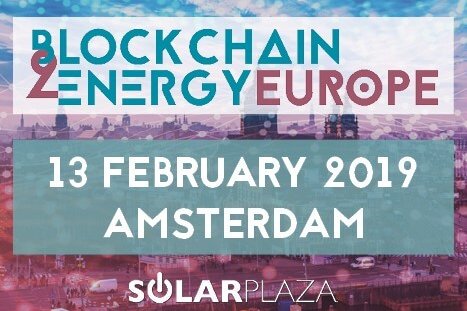

When people discuss blockchain and energy, my first instinct is to think about the energy consumption of Bitcoin that is often used as an example of why the technology cannot function. However, there is a much wider interest in the relationship between the underlying technology of blockchain and the energy industry. On Wednesday February 13th, many people will gather in Amsterdam at the Blockchain2Energy conference to discuss such possibilities.
Let’s first start by analysing the critique of Bitcoin and its high energy usage. Studies into Bitcoin’s energy usage have suggested that as the network continues to grow, Bitcoin mining will begin to consume more energy than many nation states. In an increasingly ecologically conscious society, surely there are better ways to put such energy to use than on a risky attempt to undermine the current economic system? Since the bear market has taken hold, this criticism has subsided somewhat as people from the mainstream move on to more pressing issues thinking Bitcoin has died another death.
Bitcoin maximalists counter such energy arguments by highlighting the use of renewable energy in the process of mining. Some have claimed as much as 70/80% of Bitcoin mining energy already comes from renewable sources. They also argue that as people look for more economical ways to mine Bitcoin, cheaper renewable energy is the answer. They therefore suggest that Bitcoin could even enhance the move to a cleaner energy system by showing such economic benefits.
Blockchain technology has been hailed as a decentralising force that can empower the individual over not only the state, but also major corporations. An example from Australia using the cryptocurrency PowerLedger highlights such a use case. Being a nation that is blessed with plenty of sunshine (as they constantly like to remind us “poms”), solar energy is an extremely useful tool to reduce energy bills in Australia. By placing solar panels on the roof of your house, you can reduce the cost required to rent your energy from providers.
However, if those solar panels installed on your home produce more than the electricity you consume, the remaining energy is fed back into the grid to be used by the energy companies to provide another homestead. What PowerLedger is attempting to achieve is to remove that middleman – the energy company – and allow the individual homeowners to share their excess electricity with their neighbours and be rewarded in that particular token.
Australia is not alone in exploring possible avenues for the use of blockchain in the energy sector. Europe also has a thriving sector.
The caveat in all this is that many blockchain companies are still on unsteady ground having only surfaced recently. Blockchain for now is still attributed to cryptocurrencies, which have been proven to be notoriously fickle. Whether many of these companies can or will continue to function as the bear market continues its vice-like grip remains to be seen.
Whilst around 85% of blockchain companies have or may end in failure, that does not necessarily mean that the other 15% will suffer the same fate. There is little doubt that any new start-up in an upcoming industry is extremely difficult to grow and maintain, but that doesn’t mean ambitious individuals or companies should shirk away from the challenge, especially considering the current concerns about the global environment. The issue of company failure isn’t unique to any start-up, but within the blockchain and cryptocurrency space, there is an extra sensitivity to the possibility of failure, much like there was in the early days of the internet with the dot-com bubble.
Blockchain2Energy, a conference being held in Amsterdam on February 13th, is organised by SolarPlaza and will bring together such blockchain companies to explore, compare, and discuss the successes and challenges of such a competitive but niche market. In a handy map on their website, you can see the variety of companies all across Europe that are investigating the possibilities that can arise from this industry.
The conference itself will cover the basics of blockchain and energy, the use cases, innovations within the space, and the regulatory framework currently prevalent in Europe. Rather than just companies looking for ICO funding, there are major corporations such as EDF and the World Energy Council showing that there is institutional interest in the possibilities provided. By bringing together industries at such conferences, they can show that progress is being made within the sector, not only encouraging each other that they are on the right path, but also encouraging investors that there is more to this than fluff and hype.
There is a lot of hype around blockchain and energy, and it will be interesting to see the reality of this at Blockchain2Energy in Amsterdam.
Coin Rivet has discussed the potential benefits and pitfalls of energy and blockchain many times before. Here are three potential blockchain applications in the energy sector as well as the decentralising nature effect that blockchain could have on energy.
Denver, Colorado, 24th February 2025, Chainwire
Denver, Colorado, 20th February 2025, Chainwire
Washington, D.C., 18th February 2025, Chainwire
Dubai, UAE, 27th January 2025, Chainwire
Those who enter the market at this time may be surprised to hear that Bitcoin…
George Town, Grand Cayman, 22nd November 2024, Chainwire